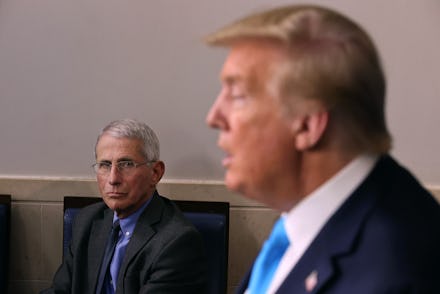Trump retweeted a message calling for Dr. Anthony Fauci to be fired

The lofty goal for Twitter was to facilitate discussion. Allow people to rattle off even small thoughts, and ideally they'll be adding something short but profound to the ether. The low barrier to entry will mean no good thought goes unshared — and add in reply and retweet functions to allow others to engage with or amplify those thoughts, and you've got a gem of a communication tool on your hands. Unfortunately, as we all know, Twitter fingers are hardly so refined these days, and President Trump has 10 of the most impulsive ones around. That's why we find ourselves in a predicament now where over the weekend, Trump retweeted a message calling for Dr. Anthony Fauci to be fired.
Fauci is the nation's leading epidemiologist and one of the main medical professionals leading the U.S.'s response to coronavirus. To fire him now, while the coronavirus pandemic rages on, and the U.S. takes the top spot globally in the death count, would be disastrous.
The tweet in question came Sunday evening from DeAnna Lorraine, a former Republican congressional candidate who ran to unseat House Speaker Nancy Pelosi in California's primary this year. Lorraine wrote that Fauci had said, on Feb. 29, that coronavirus didn't pose a serious threat to the U.S. public, but that now the doctor says Trump's ignorance of the virus cost American lives. Pitting those two sentences against each other, Lorraine appended the hashtag #FireFauci and hit send.
The president then retweeted Lorraine's message, adding context about his decision to ban travel from China — something Lorraine did not mention at all and which, studies show, had at best a moderate impact of containing the spread of coronavirus but did not necessarily save hundreds of thousands of lives as Trump has asserted.
Fauci said Sunday on CNN that "you could logically say, that if you had a process that was ongoing, and you started mitigation earlier, you could have saved lives. Obviously, no one is going to deny that." As to whether he was doubting the severity of coronavirus as recently as Feb. 29, The New York Times notes that "by the third week of February, advisers had drafted a list of measures they believed would soon be necessary, like school closures, sports and concert cancellations and stay-at-home orders, but the president did not embrace them until mid-March."
The relationship between Fauci and Trump has come under intense speculation in recent weeks, mostly as Fauci has gained prominence as a cult figure in the media space. Fauci was one of the rare medical professionals to be seen publicly discussing the administration's response to the crisis, and he's disagreed with the president on occasion as Trump floated early timelines for reopening the economy or pushed some questionable theories of potential coronavirus treatments.
Trump has insisted, though, that his relationship with Fauci is strong even as thoughts intensify that a rift has grown. Last week, Trump talked up Fauci by saying that the doctor should "move to New York" and run for Congress against Rep. Alexandria Ocasio-Cortez, so great is Trump's respect for him.
Then again, mounting a congressional campaign in New York would certainly get Fauci out of Trump's way in Washington. So whether the joke was an endorsement or a sneak-attack remains to be seen.